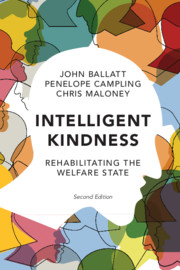Book contents
- Intelligent Kindness
- Reviews
- Intelligent Kindness
- Copyright page
- Contents
- Foreword
- Authors’ Note
- Chapter 1 The Heart of the Matter
- Chapter 2 Rescuing Kindness
- Chapter 3 A Politics of Kindness
- Chapter 4 Building the Case for Kindness
- Chapter 5 Managing Feelings of Love and Hate
- Chapter 6 The Emotional Life of Teams
- Chapter 7 Cooperation and Fragmentation
- Chapter 8 On the Edges of Kinship
- Chapter 9 Unsettling Times
- Chapter 10 Free to Serve the Public?
- Chapter 11 Blame
- Chapter 12 The Hostile Environment
- Chapter 13 The Pull towards Perversion
- Chapter 14 Cultivating Intelligent Kindness
- Chapter 15 Rehabilitating the Welfare State
- Index
- About the Authors
- Acknowledgements
- References
Chapter 10 - Free to Serve the Public?
Published online by Cambridge University Press: 28 February 2020
- Intelligent Kindness
- Reviews
- Intelligent Kindness
- Copyright page
- Contents
- Foreword
- Authors’ Note
- Chapter 1 The Heart of the Matter
- Chapter 2 Rescuing Kindness
- Chapter 3 A Politics of Kindness
- Chapter 4 Building the Case for Kindness
- Chapter 5 Managing Feelings of Love and Hate
- Chapter 6 The Emotional Life of Teams
- Chapter 7 Cooperation and Fragmentation
- Chapter 8 On the Edges of Kinship
- Chapter 9 Unsettling Times
- Chapter 10 Free to Serve the Public?
- Chapter 11 Blame
- Chapter 12 The Hostile Environment
- Chapter 13 The Pull towards Perversion
- Chapter 14 Cultivating Intelligent Kindness
- Chapter 15 Rehabilitating the Welfare State
- Index
- About the Authors
- Acknowledgements
- References
Summary
We probably all know the story. It may be apocryphal, but it sets our scene, and there are many similar examples. A mother sees her child run over by a car. Driven by her love, and her visceral drive to protect the infant, she rushes to the scene and, exercising strength far beyond what we should expect, seizes the bumper and lifts the vehicle off her child, thereby saving her from death or permanent disability. It’s a high bar to reach, but it symbolises the power of action driven by concern for those closest to us. Graphically, it demonstrates the extra dimension that the ‘kindness’ inherent in kinship and the willingness and ability to apply oneself to the service of the other can bring to a situation of risk and vulnerability. It says that kindness moves mountains.
- Type
- Chapter
- Information
- Intelligent KindnessRehabilitating the Welfare State, pp. 136 - 151Publisher: Cambridge University PressPrint publication year: 2020



